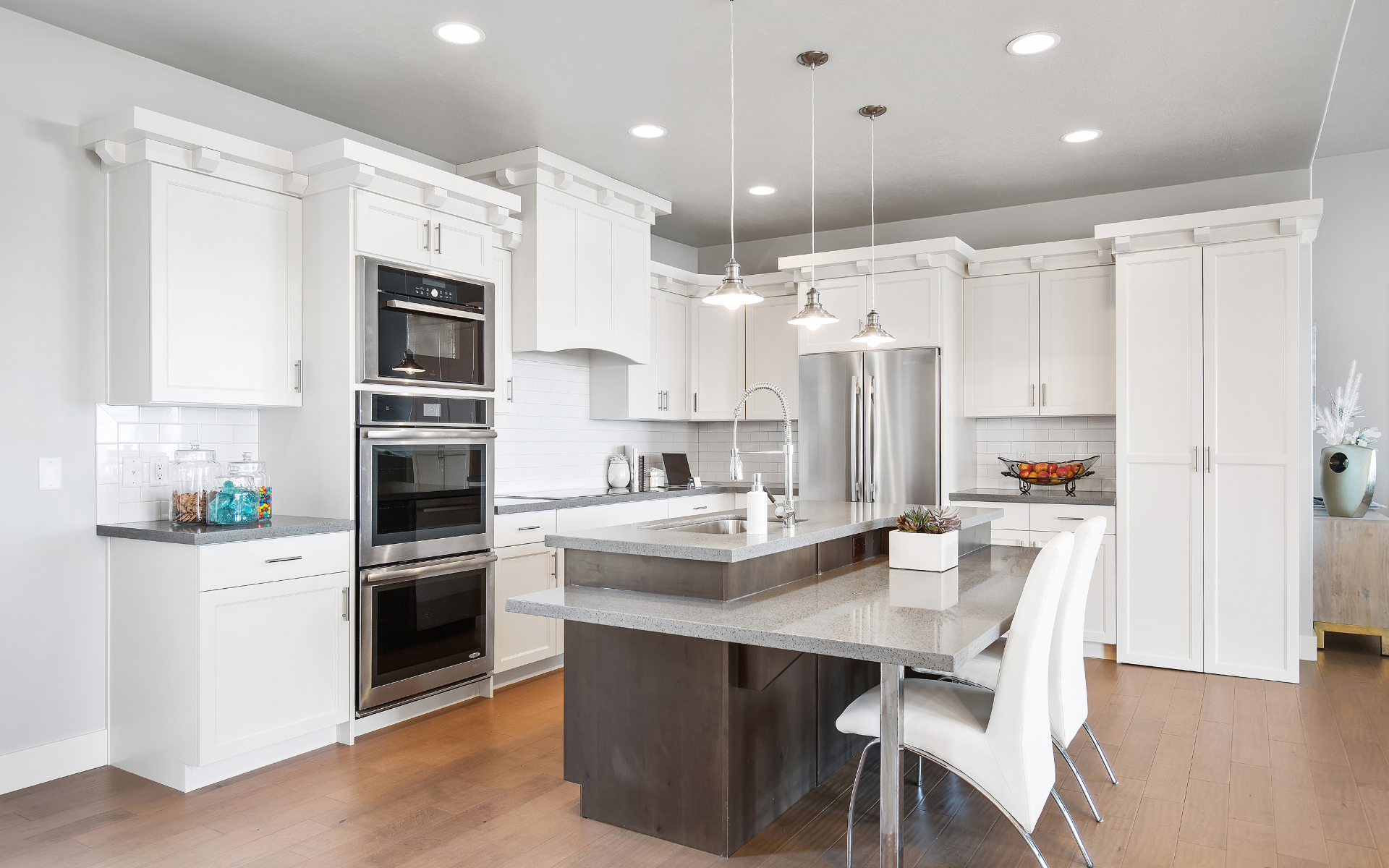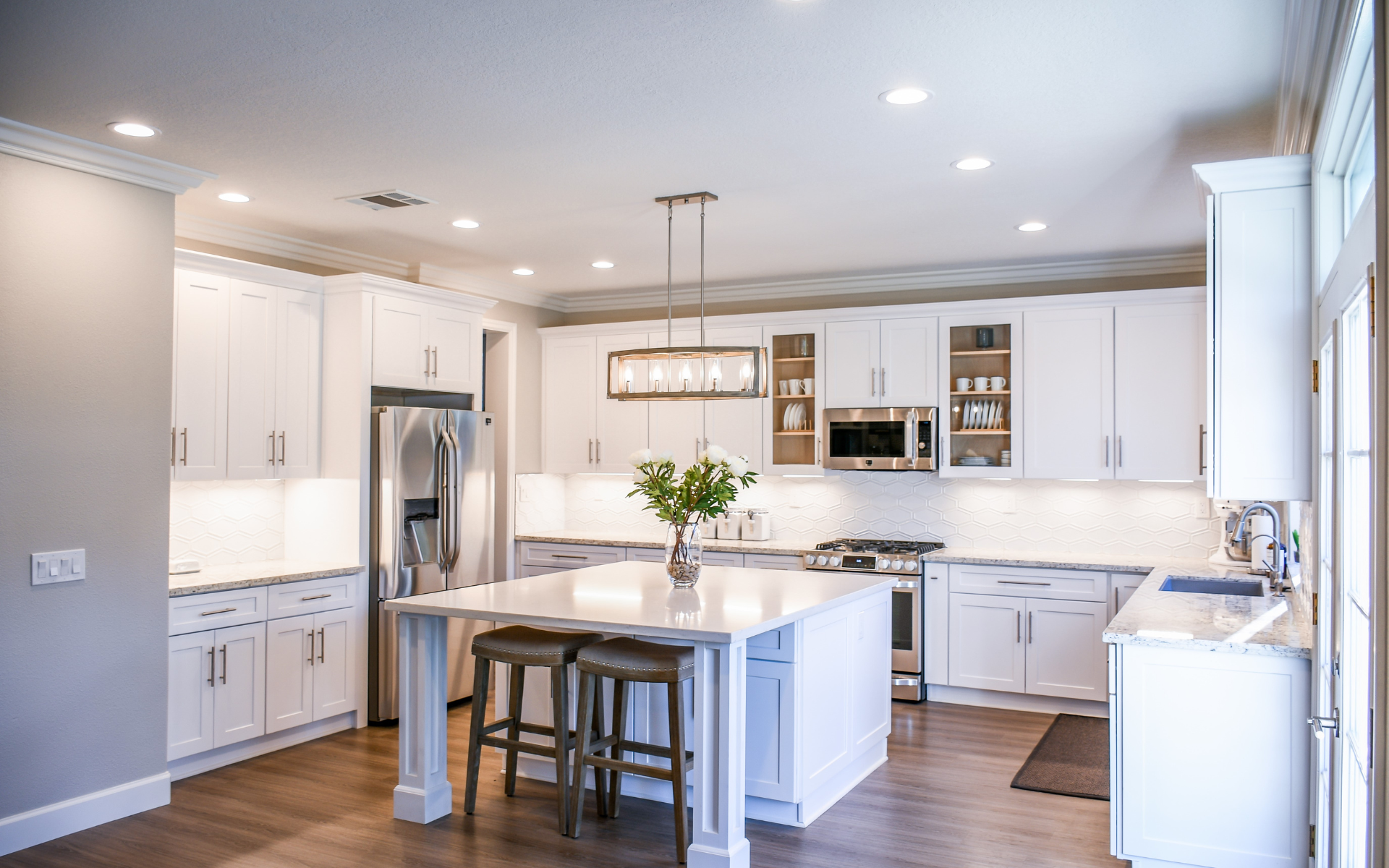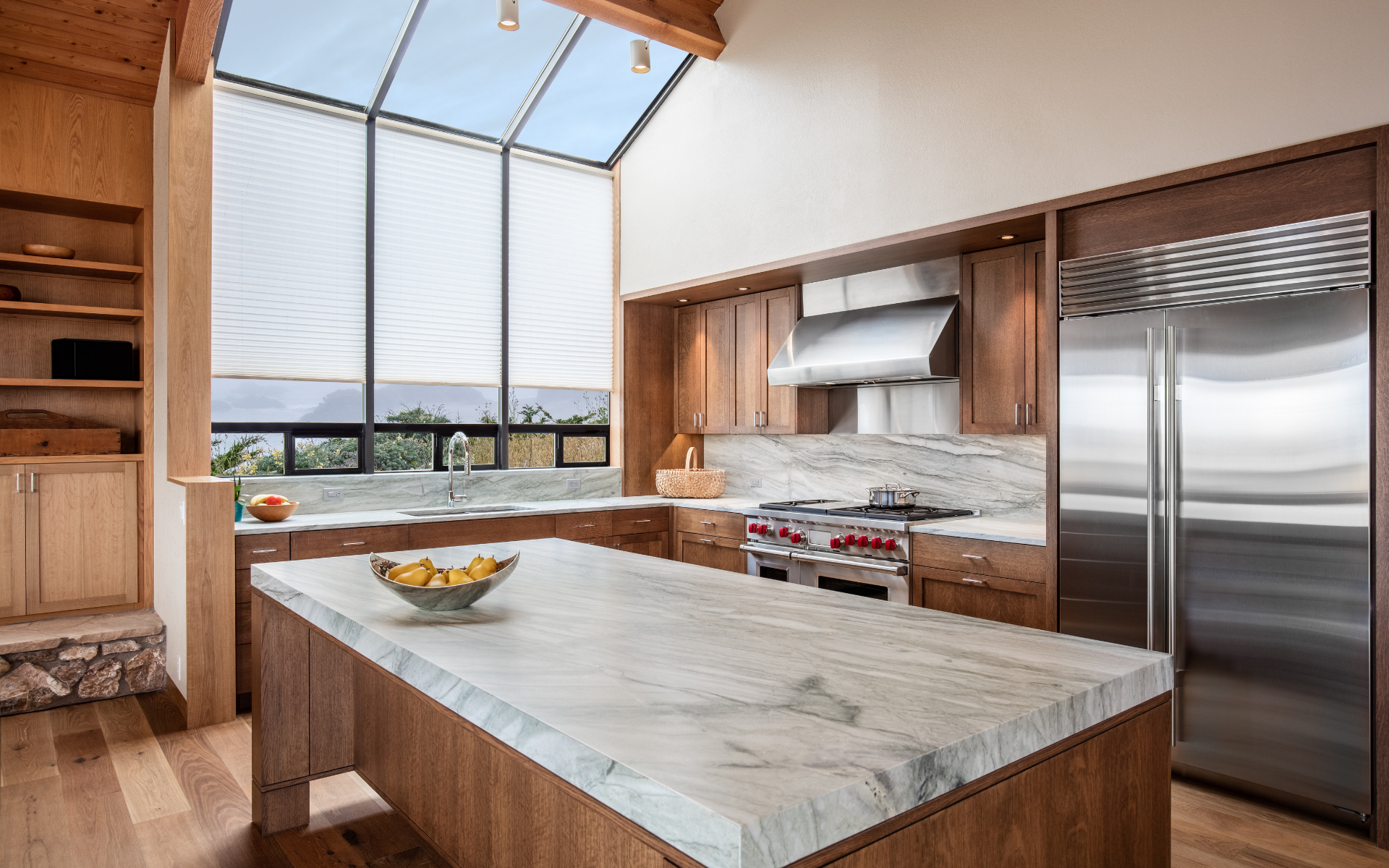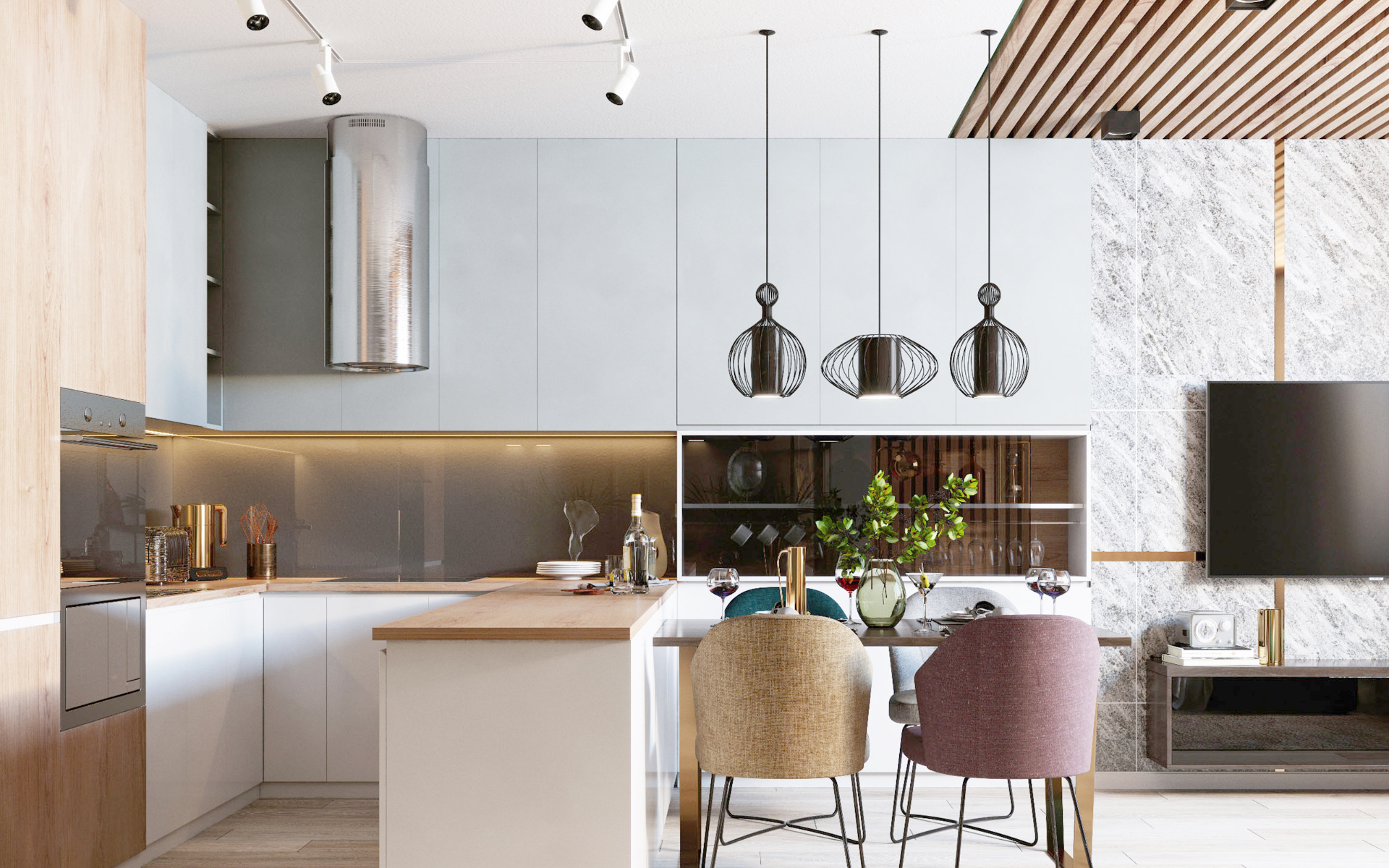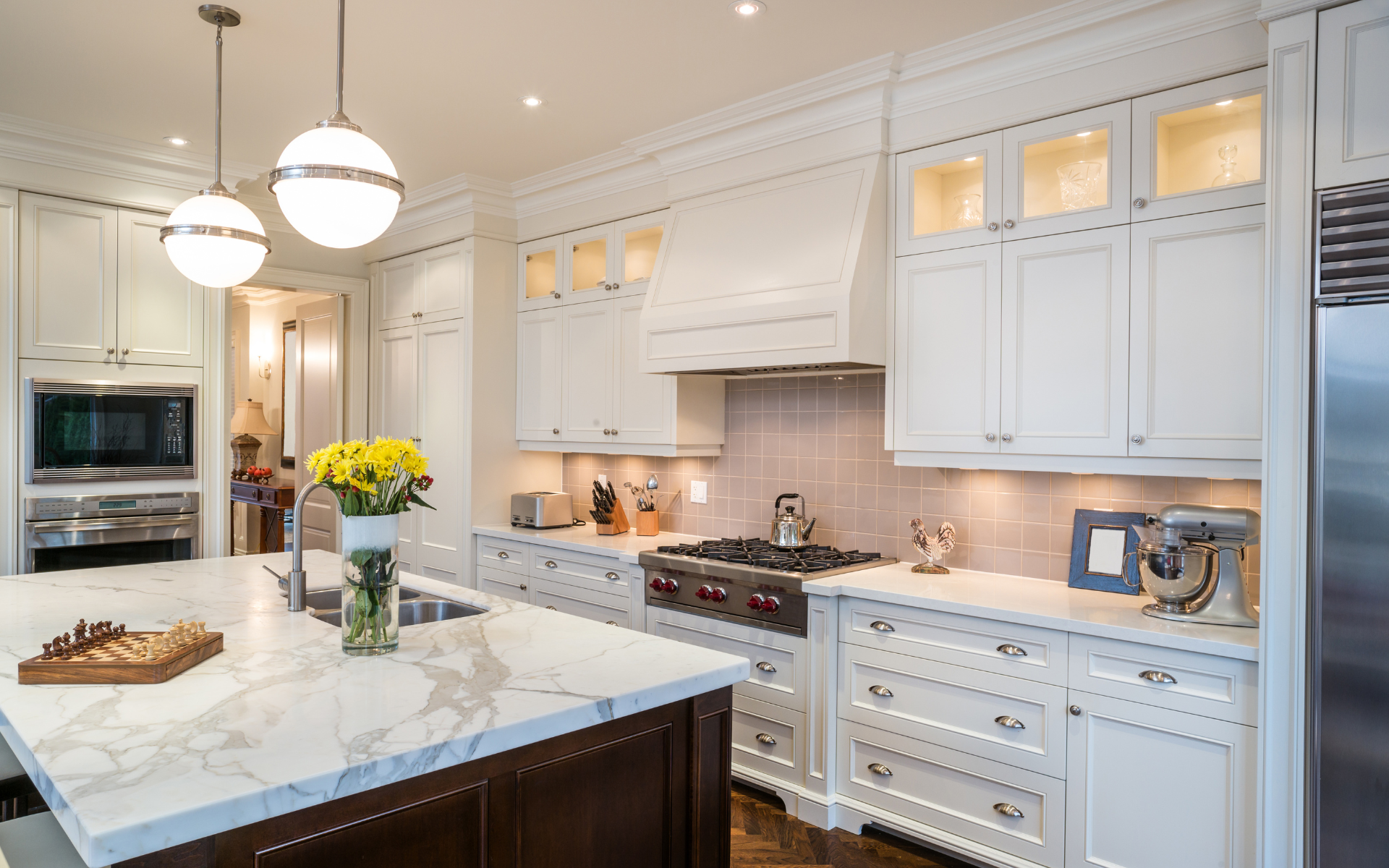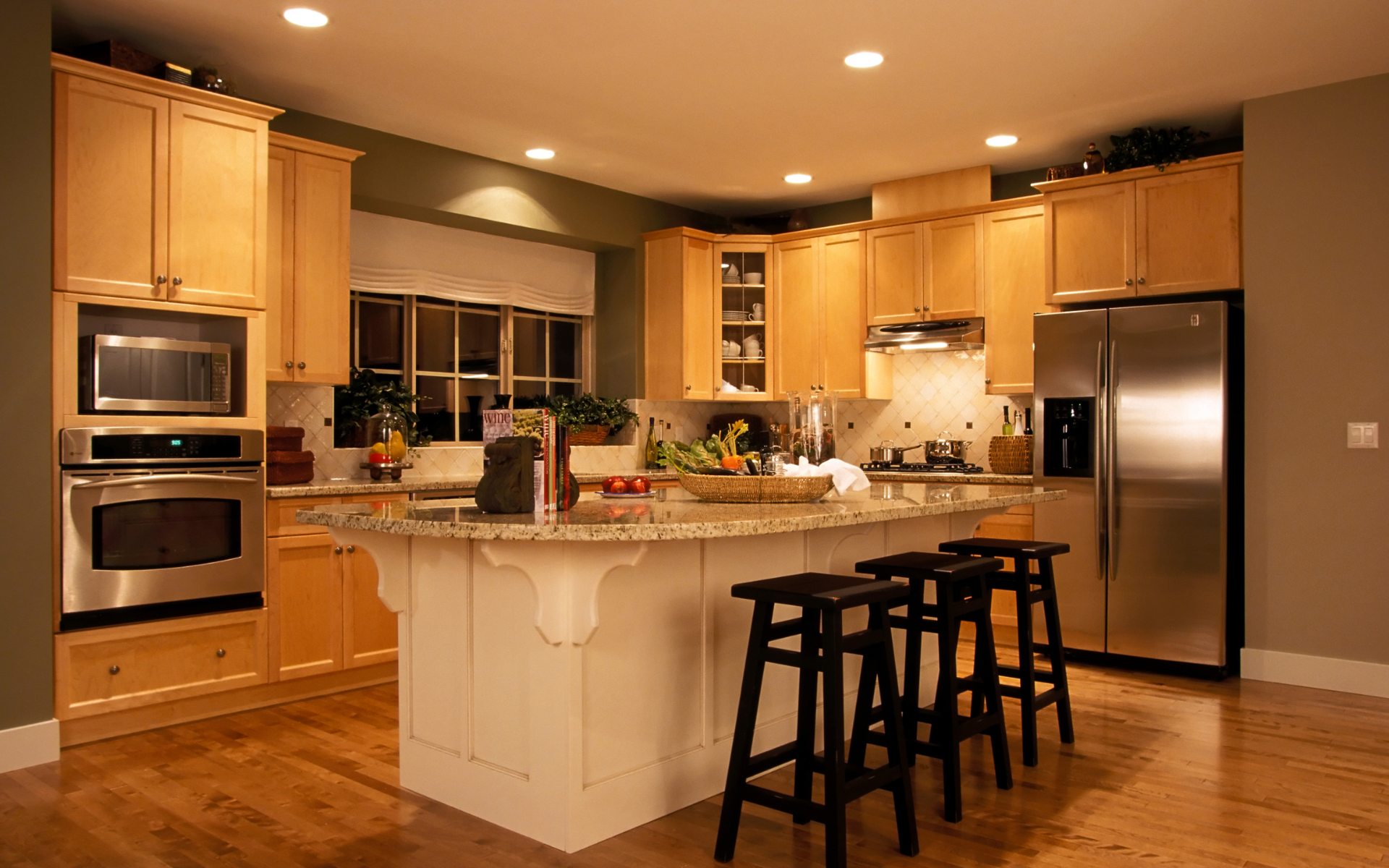Thinking of upgrading your kitchen? This is likely one of the biggest home improvement investments you’ll take on. Creating your dream kitchen requires careful budgeting from the start. Whether you’re doing a first-time kitchen remodel, planning for retirement, or simply freshening up cabinets and counters, an accurate kitchen remodeling budget ensures you don’t overspend on your kitchen remodel.
Table of Contents
In this guide, we’ll look at how to estimate costs for your kitchen and bath project accurately. You’ll learn insider tips for setting and sticking to a budget that makes the most of your available funds. With some planning and savvy decisions, you can craft your ideal kitchen transformation while avoiding costly surprises down the road.
Average Kitchen Remodel Cost
According to HomeAdvisor, the average cost for a major kitchen remodel is around $22,500, with most homeowners spending between $12,000 to $60,500 depending on the scope of work. This includes the total costs for materials, construction labor, and finishing details. Minor kitchen remodeling project comes in cheaper averaging around $7,300 nationally.
What impacts the wide range of potential kitchen remodel costs? The size of your kitchen, layout changes, material grades you select, specialty storage solutions, new appliances, and current construction costs in your area all contribute to the bottom line. Things like moving plumbing or electrical, structural work, layout changes, and high-end upgrades will drive your total costs upward. The complexity of the remodel and choices in finishes make a big difference.
Kitchen Remodel Budgeting by Type
Kitchen remodel budgets can vary widely based on the scale and specifics of your project. Here is what you can expect to spend based on the scope of your kitchen upgrade:
Minor Kitchen Remodels
A minor kitchen remodel is the simplest and least expensive upgrade option. The current kitchen’s design, size, and original layout are kept intact. Minor remodels are ideal for new homeowners on a budget or DIY-oriented homeowners looking to refresh their space.
Structural changes are avoided, keeping costs low. For simple upgrades like cabinet refacing, countertop resurfacing, refreshed backsplash tile, and new fixtures, you’ll likely spend $5,000 to $25,000. Minor remodels allow you to refresh the look of your kitchen affordably.
Medium Kitchen Remodels
A medium kitchen remodel goes beyond a simple refresh to provide a more significant midrange kitchen renovation. Medium remodels involve replacing elements like cabinets, countertops, sinks, and light fixtures rather than just repainting or refinishing them.
According to Remodeling Magazine’s Cost vs. Value report, the average cost of a medium 200-square-foot kitchen remodel is $75,571. While more involved than a minor remodel, medium kitchen upgrades don’t require full demolition and reconstruction. The finished kitchen takes on a new look with updated cabinetry, energy-efficient appliances, and finishes.
Major Kitchen Renovations
A major remodel is the most complex and expensive type of renovation. The space is completely customized, with everything changed or replaced – from layout to finishes. Walls are moved, plumbing and electricity are rerouted, and top-of-the-line appliances and custom cabinetry are added.
Since the kitchen is taken down to the studs, the layout can be completely revamped to improve functionality. High-end countertops, imported tile, and designer fixtures create a luxurious new kitchen.
Major kitchen remodels allow you to achieve a fully modern, customized dream kitchen with all-new cabinetry, appliances, finishes, and an improved floor plan. They require significant demolition and reconstruction but the result is a showstopper kitchen. Costs typically exceed $100,000.
Kitchen Remodel Cost Breakdown
When estimating your overall kitchen remodel budget, it helps to think about how costs break down across the various elements of your project. Allocating percentages of your total budget to categories ensures you distribute spending wisely.
Below we’ll look at typical budget allotments and considerations for key parts of your kitchen renovation.
Appliances and Fixtures
Appliances and fixtures including the range, refrigerator, dishwasher, sink, and faucets can account for 15-25% of your total kitchen remodel budget. Budget at least $5,000-7,000 for a suite of mid-range appliances. Professional-grade appliances can run $15,000 or more.
When selecting fixtures and appliances, focus on durability and energy efficiency over flashy but expensive options. Look for rebates and sales on appliance packages to maximize value.
Cabinetry
Investing in quality cabinetry makes a huge impact, with cabinets claiming 25-50% of your total budget. Stock cabinets cost $100-200 per linear foot while semi-custom runs $200-500+ per foot. Details like inset doors, storage inserts, and specialty finishes add costs quickly.
Focus cabinet spending on visible areas like bases and leave less visible spots for more affordable options. Optimize storage with organizational inserts and functional design.
Countertops
Countertops account for 10-15% of your kitchen remodel budget on average. Material choices like laminate, quartz, granite, marble, and concrete range from $20 up to $200 per square foot installed.
Pick countertops that stand up to your lifestyle – splurge on main prep areas and save on peripherals. Undermount sinks and decorative edges also increase costs.
Flooring
New flooring builds your kitchen’s style, typically claiming 5-15% of your budget. Choices like tile, vinyl plank, hardwood, linoleum, and poured floors range from $3-20 per square foot installed.
Durable, low-maintenance materials like luxury vinyl tile offer affordable options. Water-resistant flooring is a smart pick for kitchens. Look for sales on materials to supplement your budget.
Kitchen Design & Layout
Professional design fees plus structural changes like moving walls or plumbing can range from 5-15% of your total budget. Complex layout changes and high-end design services hit the higher end.
Focus on changes that maximize function and storage for your investment. Minimize changes to existing plumbing and electricity.
Lighting Fixtures
Beautiful lighting draws eyes up, typically accounting for 2-10% of your kitchen remodel budget. Task lighting, accent lighting, island pendants, and under-cabinet lights enhance usability.
Combine affordable LED fixtures with a few designer focal points. Dimming controls add convenience at a low cost.
Kitchen Contractors Service
Skilled contractor fees make up a significant portion of any kitchen remodel, averaging between 20-40% of your total budget. Simple DIY projects allow you to complete more work yourself to save on labor. However extensive demolition, electrical, and plumbing work requires hiring professional tradespeople in most cases.
Get multiple bids and check reviews to find reliable pros. Look for ways to assist with prep and finishing work to control costs.
Tips for Saving on Your Kitchen Remodeling Budget
Follow these tips to keep your kitchen remodel budget on track:
- Prioritize Must-Haves: Focus spending on upgrades that have the biggest impact on your enjoyment of the new kitchen. Save on things unlikely to get much use or attention. Go high-end for key surfaces like counters and islands.
- Use Stock Materials and Items: Opt for quality stock cabinets and countertops over pricey custom options. Check big box stores for appliances and fixtures. Use stock materials creatively to get semi-custom looks and maximize your budget.
- DIY Some Tasks: Consider what projects like painting walls, lighting, tile, and resurfacing you can handle to save on labor costs. But leave complex structural, electrical, and plumbing work to professionals.
- Get Multiple Bids: Price shop with several contractors to find the best value. Compare detailed bids apples to apples. Ask for discounts on materials purchased through the contractor.
- Stick to the Budget: Build in 10-15% contingencies for unexpected costs. Once your budget is set, resist expansions and upgrades that derail spending. Change orders add up fast.
Doing your homework upfront and tracking all costs in detail makes it easier to stay on budget with your kitchen upgrade.
Final Thoughts
Determining the right budget for your kitchen remodel takes some homework but ensures you can complete the project you envision. Build in contingencies for the unexpected. Looking at helpful references and real-life ranges reported by other homeowners can provide a useful benchmark. For a major kitchen upgrade, consulting kitchen designers or contractors for an expert budget estimate can be worthwhile to forecast costs accurately. With realistic budgeting and careful tracking as you go, you can upgrade your kitchen smoothly without breaking the bank.
